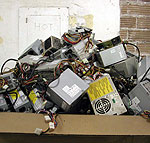By Stephanie Hemphill
Minnesota Public Radio
April 8, 2002
If you have a computer gathering dust in a closet, you're not alone. According to one estimate, Americans will discard about 500 million PCs in the next five years. Computer parts contain lead and other heavy metals. They shouldn't be sent to the landfill or burned in incinerators. Now the industry has taken the first step in setting up a national system to deal with used electronics gear. They plan to impose a disposal charge on sales of new equipment. The state of Minnesota has had a leading role in developing the system.
| |
|
|
|
||
Recycling electronics products is a growing industry.
Lifecyclers is a Duluth non-profit that accepts used electronic gear from businesses and individuals. There are collection centers like this all over the country.
Boxes stuffed with computer parts fill the warehouse floor. They're waiting to be sent off for processing.
Operations Manager Corey Martinson says business has been growing every month since Lifecyclers opened nearly two years ago.
"Right now we average a good shipment a month," he says. "That's a semi-load of monitors, double stacked with plastics. Then, every two months we send out circuit boards, power supplies, transformers." Each part goes to a different recycler.
LifeCyclers gets money for some of the parts, but they have to pay the company that takes the monitors. So they charge 50 cents a pound to take old computers off people's hands.
That could change, as a result of a new agreement between major electronics manufacturers, environmental activists, and some state governments.
These groups have been meeting every few months for the last year to try to design a better way of handling the growing avalanche of old computers.
In March they agreed to create a recycling system that'll be paid for up-front. That means anyone buying a computer or television or cell phone, will pay a few dollars more. This will pay for recycling when the gadget reaches the end of its useful life.
| |
|
|
|
||
Sherry Enzler directs Minnesota's Office of Environmental Assistance. She says charging up front to take care of products at the end of their life would discourage illegal dumping. And there are economies of scale.
"If you had a fee at the point of sale," she says, "it probably would be a lower fee because we're selling more than we're collecting. But it also would be such that we would have money immediately to address the products as they come in and we wouldn't have to worry about tracking down old manufacturers."
Enzler says the group's decision to go with an up-front financing system is important. It's the first step in creating a system to handle electronic waste.
But there are still a lot of questions. Which items will be covered? Who will collect the fee, and how will it cover the costs of handling the waste?
The biggest headache - and the biggest cost - is in collecting the goods from homes and businesses, and shipping them to processors.
Hewlett Packard's Chris Altobell says manufacturers don't want to get into that business.
"We do think there is a role for municipalities to play in the collection from their constituents or the consumers out there," says Altobell. "You know, it's your trash company, and there's also municipalities that have drop-off events, household hazardous waste drop-off infrastructures."
Producers like Hewlett Packard say they are willing to share responsibility for electronics waste with consumers, retailers, and government.
But environmental activists want to put the heaviest burden on manufacturers. They say that would provide the strongest incentive for companies to design products that use less toxic material and are easier to recycle.
David Wood from the GrassRoots Recycling Network says that approach is working in Europe and Japan.
"The companies here in the US who say they just can't do this, they can't take responsibility for their products, are doing exactly that in Europe," he says. "And they're doing it because it's required by law."
The group working on electronics waste will meet again in Minneapolis in June. They hope to have a plan in place by fall.
More Information

